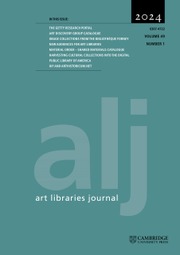Article contents
Art Libraries and Book-Learning
Published online by Cambridge University Press: 06 June 2016
Abstract
The concept of artistic knowledge is considered, that which is unique to the artist and that which can be acquired by other means, particularly from the storehouse of a library’s collections. The problem of art being at a remove in a library can be countered by collections of ‘real’ art e.g. artists’ books, and by outgoing, generous art librarianship. The art library can also make its own contribution to the maintenance of traditional artistic knowledge by concentrating at least a part of its collections on whatever is unique in its own area, thus counterbalancing the tendency to uniform, ‘monochrome’ coverage.
- Type
- Research Article
- Information
- Copyright
- Copyright © The Art Libraries Society 1976
References
- 1
- Cited by


